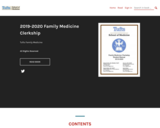
This pressbook corresponds to the curriculum for the Tufts Family Medicine Clerkship.
- Subject:
- Health Sciences
- Material Type:
- Unit of Study
- Provider:
- Tufts University School of Medicine Pressbooks
- Author:
- Tufts Family Medicine
- Date Added:
- 04/03/2020

This pressbook corresponds to the curriculum for the Tufts Family Medicine Clerkship.
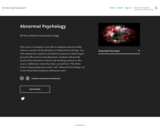
This course is designed to provide an engaging and personally relevant overview of the discipline of Abnormal Psychology. You will examine the cognitive and behavioral patterns which impair personal effectiveness and adjustment. Students will provide much of the substantive content and teaching presence in this course. Additional content has been curated from "The Noba Project (http://nobaproject.com/)" and "Abnormal Psychology: An e-text! (http://abnormalpsych.wikispaces.com/).
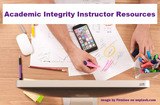
Academic cheating is a growing problem in educational institutions around the world, and it can take many forms, including plagiarism, collusion, and cheating during exams. Academic cheating can have serious consequences for students, educators, and the academic community as a whole.The Academic Integrity Instructor Resource Platform is a growing and evolving online resource designed to support and promote academic integrity among faculty members. This resource serves as a go-to platform for faculty seeking guidance, tools, and best practices to foster a culture of academic honesty and prevent plagiarism and cheating within their online, online-live, hybrid, and face-to-face, classrooms.

This resource contains a student activity handout, a facilitation guide, example solutions, and class notes. Students work together to discover one-to-one correspondences between various infinite sets of numbers and the set of natural numbers. At the end of this activity the compiled results of their group work form a list of infinite sets that all have the same cardinality as the set of natural numbers. Instructors may take this lesson further by discussion countably infinite versus uncountably infinite sets. This activity aligns with MATH 1332 Learning Outcome 1: Apply the language and notation of sets.
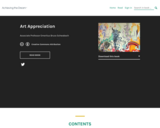
This book contains the course contents for a course on Art Appreciation.
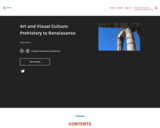
This book is a cloned version of Introduction To Art by Muffet Jones, published using Pressbooks under a CC BY (Attribution) license. It may differ from the original.

This resource contains a rubric, an activity handout, a facilitation guide, and tex files. The material is meant to be used for those teaching a college algebra course. The activities are meant to provide a deeper understanding (than a traditional course offers) of some of the topics covered in a college algebra course. The activities are intended for group activities and options exist for use in a single class or multiple classes.

The multi-lesson "Best Class/Worst Class" project provides a way for students and professor to set expectations for course performance collaboratively, while simultaneously modeling productive online interaction strategies. Students become more aware of their own learning process and the processes of those with whom they will be working, creating necessary bridges to successful collaboration. In addition, students are able to develop practical skills in navigating the online environment before being tasked with heavily-weighted course components.This project is designed to be implemented alongside discipline-specific course content.

This is a study module on evolution for the non-science majors biology lab. It has been modified from other OER material.The Title image is of the Zaniskari which is a breed of small mountain horse or pony from Ladakh union territory of India. Attribution: Eatcha, CC BY-SA 4.0

This is a study module on evolution for the non-science majors biology lab. It has been modified from other OER material.Attribution Title image: Eatcha, CC BY-SA 4.0

Business and Professional Communication

An overview of tips, tools, and resources for all your citation needs

It's important to cite sources you used in your research for several reasons:
To show your reader you've done proper research by listing sources you used to get your information
To be a responsible scholar by giving credit to other researchers and acknowledging their ideas
To avoid plagiarism by quoting words and ideas used by other authors
To allow your reader to track down the sources you used by citing them accurately in your paper by way of footnotes, a bibliography or reference list

This resource contains activity handouts, a rubric, a facilitation guide, and tex files. The material is meant to be used for those teaching a college algebra course. The activities are meant to provide a deeper understanding (than a traditional course offers) of some of the topics covered in a college algebra course. The activities are intended for group activities and options exist for use in a single class or multiple classes.

The Universal Design for Learning (UDL) for Inclusion, Diversity, Equity, and Accessibility (IDEA) project was a collaboration between 10 universities and colleges across Ontario to develop a 6-module open educational resource for post-secondary educators to help them understand their responsibilities under the Accessibility for Ontarians with Disabilities Act (AODA). It will help instructors and others to incorporate principles of UDL and considerations of EDI and Indigenisation in their learning environments. (taken from Merlot entry: https://merlot.org/merlot/viewMaterial.htm?id=773412101)

This resource contains class notes, an activity handout, and a facilitation guide. Students play the game “Let’s Make a Deal” to explore the underlying probability that guides the optimal strategy for contestants. This activity aligns with MATH 1342 Learning Outcome 3: Compute and interpret empirical and theoretical probabilities using the rules of probabilities and combinatorics.
![Contextual Analysis Research Unit [Resource]](https://img.oercommons.org/160x134/thecb-production/media/screenshots/525a20a1e132ff30014f37c4441b568c328d7b3dd36dcb285528fd2324b8b2d4.png)
This resource models a possible research unit for instructors interested in guiding students through contextual literary analysis. As such, this resource outlines strategies for delving into the biographical, historical, and cultural contexts of recommended mentor texts, such as ‘The Yellow Wallpaper’ by Charlotte Perkins Gilman and ‘Hills Like White Elephants’ by Ernest Hemingway. Additionally, this resource provides a suggested pacing for the unit as well as an outline and rubric for crafting and evaluating the final essay. By the end of this section, instructors will be equipped to design their own contextual analysis research unit that suits their class interests and needs.
Author: Katherine Yoerg
Editor: Mary Landry, C. Anneke Snyder
Supervisor: Terri Pantuso
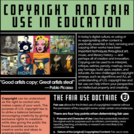
A handout that describes the importance of copying and remix, introduces US copyright allow and the fair use doctrine, provides examples of important cases that have involved fair use and intellectual copyright, and details current issues surrounding copyright in education.
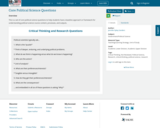
This is a set of core political science questions to help students have a baseline approach or framework for understanding political science course content, processes, and outputs.
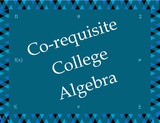
This resource includes online homework and quizzes, lecture notes for instructors (some with guided note packets or student versions), sample syllabi, sample schedules, and sample exams used in a corequisite College Algebra course, where students are enrolled in both Intermediate and College Algebra simultaneously. All of the resources can be used for a stand alone College Algebra course, with minor editing.